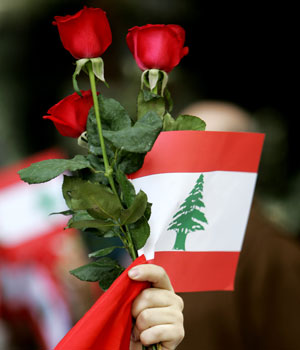
A man carries roses and a Lebanese flag during a protest against Israel’s military offensive in Lebanon outside of the United Nations Organization (ONU) in Mexico City, Mexico, July 20, 2006 (AP)
BEIRUT, July 21 (Reuters) – Israel warned Lebanese civilians to leave border villages on Friday and called up thousands of reserves in a possible prelude to a ground offensive that would expand its 10-day-old campaign against Hezbollah guerrillas.
Israel has so far failed to stop Hezbollah cross-border rocket attacks, despite relentless bombardment which has killed 343 people and destroyed much of Lebanon’s infrastructure.
Three explosions were heard in the northern Israeli city of Haifa, a favoured target for Hezbollah rocket crews, on Friday, but there were no immediate reports of casualties.
Israeli planes dropped leaflets over south Lebanon, warning civilians to leave border villages for their own safety.
The army called up several reserve battalions, which can each comprise up to 1,000 soldiers, a military source said.
“It’s possible that in the coming days our ground operations will increase,” Brigadier-General Alon Friedman said earlier.
Elite Israeli troops have been launching small-scale raids in Lebanon to try to stop Hezbollah rocket attacks on Israel.
But Israel has been wary of launching a full-scale invasion in south Lebanon, only six years after it ended a 22-year occupation that was resisted by Hezbollah guerrilla attacks.
Lebanon’s defence minister said the army, which has not fought so far despite losing a score of soldiers in Israeli air strikes, said it would defend the country against invasion.
Asked if the army would fight alongside Hezbollah against any Israeli ground incursion, Lebanese Defence Minister Elias al-Murr told Al Arabiya television: “Our constitutional duty is to defend Lebanon as a Lebanese army. This is our role.”
The United Nations and many of its members have called for an immediate ceasefire in Lebanon, but the United States says this would not solve the conflict unless Hezbollah, which is backed by Syria and Iran, is prevented from attacking Israel.
Fleeing daily Israeli bombardment and a gathering humanitarian crisis in Lebanon, thousands of tired, frightened foreigners flooded into Cyprus, sparking warnings by officials that the small island may not be able to cope with the influx.
“They (the Israelis) are targeting civilians. They call themselves civilised, but they are barbaric,” said Habib Kheil, a mathematics professor from Michigan who had fled to Cyprus.
Israel’s campaign in Lebanon has forced up to half a million people to flee their homes. Bombs have wrecked dozens of roads and bridges, making it hard to reach distressed civilians.
“The siege on Lebanon is not letting humanitarian aid in,” said Hisham Hassan, spokesman for the International Committee of the Red Cross (ICRC). “The south is isolated.”
Two ICRC trucks with 24 tonnes of food, first-aid kits and medicine were on their way from Beirut to the southern port of Tyre, where casualties have overwhelmed the main hospital, on Friday in the relief group’s first such convoy, he said.
Israel began its assault after Hezbollah captured two soldiers and killed eight in a cross-border raid on July 12. It has also waged a military campaign in Gaza since June 28 to recover another soldier, seized by Palestinian militants.
Israeli Prime Minister Ehud Olmert said the war in Lebanon would go on. Hezbollah leader Sayyed Hassan Nasrallah said no amount of international pressure would deflect the guerrilla group from its demand the Jewish state agree to a prisoner swap.
Hezbollah has fired a total of more than 900 rockets at northern Israel, killing 15 civilians.
Nineteen Israeli soldiers have also been killed in the conflict, including four in firefights just inside Lebanon on Thursday. Hezbollah said it lost two fighters in the clashes. Israel said two of its helicopters collided near the Lebanese border, killing a pilot and injuring three crewmen.
Israelis still overwhelmingly back the war, with 90 percent wanting it to go on until Hezbollah is driven from southern Lebanon, a poll in Maariv newspaper showed on Friday.
Israeli jets bombed Shi’ite districts in Beirut, the eastern Bekaa Valley and southern Lebanon around sunrise on Friday and hit a previously bombed bridge on the Beirut-Damascus highway.
At least eight people were killed, bringing the death toll to 343, based on revised Health Ministry figures.
French Foreign Minister Philippe Douste-Blazy began talks in Beirut with Lebanese politicians on how to end the conflict.
U.S. Secretary of State Condoleezza Rice is expected to travel to the region next week.
In Gaza, Palestinian medics said Israeli shelling killed a Hamas militant and three civilians on Friday, as tanks and troops withdrew from a refugee camp after a three-day assault.

An Israeli soldier covers his ears as a mobile artillery unit fires a 155mm shell towards Hezbollah targets in southern Lebanon, 21 July 2006, Kiryat Shmona along the northern Israeli border with Lebanon (AFP)

Lebanese walk in the rubble of a bridge after an Israeli warplane missile strike destroyed it, in the southern village of Saksakiyeh, south of the port town of Sidon, Lebanon, July 21, 2006 (AP)
